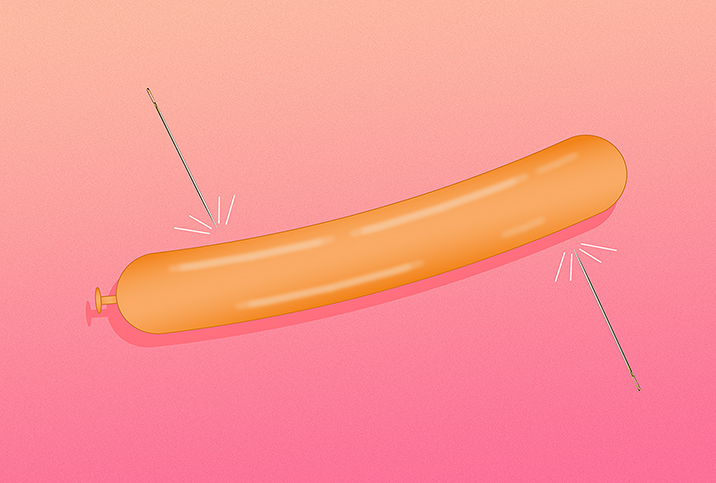Why Am I Losing Sensitivity In My Penis?

As if men with diabetes need another reason to keep their blood sugar levels under control—heart disease, kidney disease, eye complications among them—here's another one: You could lose sensitivity in your penis.
While it's normal for some diminished penis sensitivity to accompany age, the culprit could be a chronic condition. Along with injury, surgery, psychological issues and erectile dysfunction (ED), metabolic conditions such as diabetes or neurological conditions such as multiple sclerosis (MS) can cause a man to lose some of that sensitivity in his dick.
Unfortunately, this phenomenon can be difficult to diagnose and treat, even giving urologists some pause.
"Whether or not it's something that's going to be there forever or is chronic is hard to say," said Seth Cohen, M.D., an assistant professor of urology and the director of sexual medicine at New York University Langone Health in New York City. "Everybody's different. If it's a guy who has prostatitis, that's going to be a short one. Postsurgical changes or a diabetic, those are going to be long-lived."
For patients with decreased penile sensitivity, the most important thing to do is make sure nothing else is going on neurologically, according to urologist Jesse Mills, M.D., the director of the Men's Clinic at UCLA in Los Angeles and the author of the book "A Field Guide to Men's Health."
How diabetes and MS can cause lost sensitivity in a penis
Diabetes is the most common chronic cause of decreased penile sensitivity Mills sees in his practice, he said. This is associated with diabetic neuropathy, a serious diabetes complication in which high blood sugar damages nerves throughout the body.
While diabetic neuropathy most often presents in the nerves in the legs and the feet, it can cause a lack of sensitivity in the penis, too. Low testosterone can also cause a diminished sensation in the penis.
Men who have chronic neurodegenerative diseases such as MS or amyotrophic lateral sclerosis (ALS) are generally easy to identify by taking a good patient history, Mills explained. MS is a disease in which the immune system attacks the protective sheath that covers the nerves, causing communication problems between the brain and the rest of the body. MS can, therefore, have a desensitizing effect on the penis that could result in a lack of sensation.
A primary determination Martin Kathrins, M.D., will attempt to make is if the patient has altered sensation or paresthesia (an abnormal sensation) in other parts of their body that ties to an underlying chronic metabolic or neurological condition.
Alcoholic neuropathy, or nerve damage caused by excessive alcohol consumption, can contribute to general sensorium changes that may affect the penis, said Kathrins, an assistant professor of surgery at Harvard Medical School and a urologist at Brigham and Women's Hospital in Boston.
"It's very challenging and also not a neat way to evaluate these patients, unfortunately," Kathrins said, adding that he occasionally gets a neurologist involved when there's no apparent physical abnormality. "Diabetes doesn't always do this; it's not a foregone conclusion. Paresthesia in the legs certainly won't always present in the genital area. It seems to be the exception to the rule."
Kathrins and Mills both said they have had patients complain about an inability to achieve orgasm due to a lack of sensation in their penis.
"The problem is oftentimes there's not a specific neurologic abnormality that we can identify," Kathrins said. "There's not an easy intervention for that. It ends up being very frustrating."
No cures, just treatments for a less sensitive penis
Mills said many men with diminished penile sensitivity get erections that feel less firm than usual. Optimizing their erection through medication or surgery can stretch out the nerve fibers, helping them to recover much of the sensitivity.
"I will say the majority of guys I see with that complaint, if I can normalize their testosterone and put them on a good regimen of the PDE5 inhibitors, I can make them better without getting into some of the deeper neurologic causes," Mills said, referring to drugs such as sildenafil and tadalafil.
For people with diabetes, improving glucose control, lowering the hemoglobin A1C level, eating better and exercising more frequently can improve blood flow to the penis, which may help penile sensitivity, Cohen explained.
"PDE5 inhibitors can make the penis girthier and more engorged, and we suspect that that also helps to sort of activate the nerves a little bit better," Cohen said. "There are no cures; these are just treatments."




















